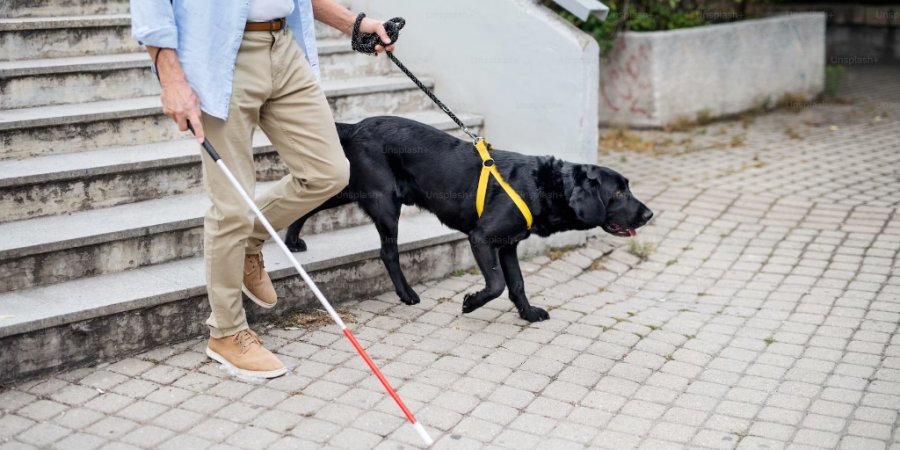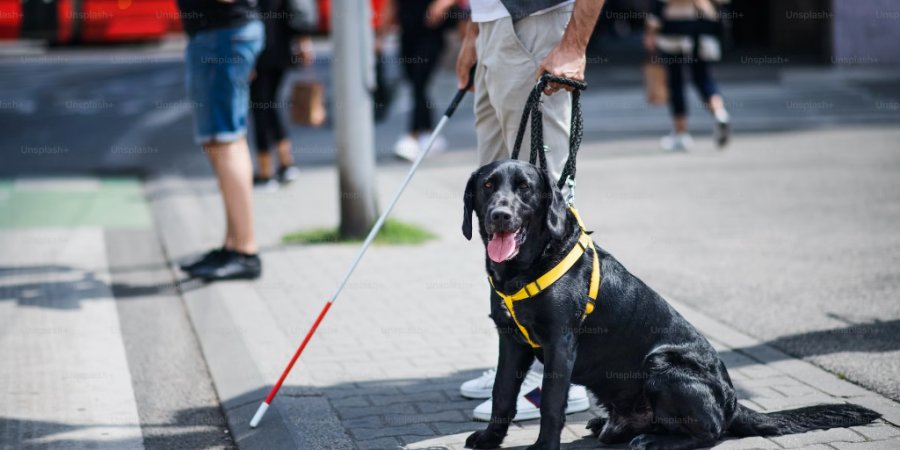Legal Questions for Service Animals Answered

Service animals provide critical assistance to people with disabilities. However, there are many legal questions surrounding service animals that are not always straightforward. In this blog post, we will provide an overview of some common legal issues related to service animals and the rights of disabled individuals who rely on them.
What is the legal definition of a service animal?
The Americans with Disabilities Act (ADA) defines a service animal as a dog or miniature horse that is individually trained to do work or perform tasks for a person with a disability. The work or tasks performed must be directly related to the handler's disability. Examples include guide dogs for the blind, alert dogs for people with epilepsy, and psychiatric service dogs. Animals that solely provide emotional support do not qualify as service animals under the ADA.
Where are service animals allowed access?
The ADA requires that service animals be permitted into any place that is open to the public. This includes restaurants, hotels, grocery stores, retail shops, hospitals, taxis, theaters, and more. The only exceptions are if the animal is out of control or not housebroken. Allergies or fear of animals are generally not valid reasons for denying access to service animals.
Can a business owner ask me about my disability?
No. Business owners may only ask two questions - is the dog a service animal required because of a disability? And what work or task has the dog been trained to perform? They cannot require special ID cards for the dog or ask about the person's disability.
Can I be charged extra fees or deposits?
No. People with service animals cannot be isolated from other patrons, treated less favorably, or charged fees that are not charged to other patrons.
What about apartment buildings and homeowner's associations?
The Fair Housing Act requires landlords and homeowner's associations to provide reasonable accommodations for tenants with disabilities who require service dogs. They cannot forbid service animals or charge pet deposits for service dogs.
Do I need any special registration or ID cards?
There are no federal registration or certification requirements for service dogs. Some service dog training organizations provide ID cards, vests, or certificates, but these are not legally required or recognized under the ADA.
Can I be asked to remove my service animal from an area?
Businesses must allow service animals to accompany their handlers. However, if the animal is barking, jumping, not housebroken, or posing a direct threat, the business can request that the team leave. Any such removals must be determined on an individual basis and not based on general assumptions or stereotypes.

What types of documentation can I be asked to show about my service animal?
You cannot be required to show proof of certifications, special ID cards, licenses, medical documentation, or specific service animal training. However, some individuals choose to carry voluntary registrations or certificates from training organizations. You can show these if you wish, but they are not required.
Can I train my service animal myself?
Yes, you are allowed to self-train your service animal. There is no requirement to use a certified training program or professional trainer. However, self-trained animals must still be able to perform disability-related tasks to qualify as service animals.
Can I be charged a pet fee if I leave my service dog in a hotel room?
No, hotels and other public accommodations cannot charge pet fees for service dogs even when the handler is not present. However, if substantial damage is done by the service animal, the hotel may be able to charge for repairs.
What should I do if my service animal is denied access?
First, educate the business about their legal duty to accommodate service dogs. If education does not work, you can file an ADA complaint with the U.S. Department of Justice. Consulting a lawyer to send a letter advocating your rights is also an option. Just make sure to document details like dates, times, locations, and individuals involved.
Can I take my service dog with me anywhere in public?
Generally yes, but there are a couple exceptions. Service animals can be removed if they are threatening safety or health. Also, some places like operating rooms or burn units in hospitals may limit service animal access. Restrictions would be made on a case-by-case basis though.
What requirements are there for service animal behavior?
Service animals are expected to be under the handler's control at all times in public. They should not be aggressive, barking, jumping on people, biting, or urinating/defecating in inappropriate places. If the animal exhibits disruptive behavior, businesses can request that the team leaves.

Are emotional support animals considered service animals?
No, emotional support animals provide comfort but are not trained to perform work or tasks related to a disability. They do not have public access rights under the ADA. Some housing providers may allow emotional support animals as a reasonable accommodation.
What is the difference between a service animal and a pet?
A key difference is that service animals are trained to perform tasks that assist people with disabilities, while pets provide companionship. Under the ADA, only dogs and miniature horses can be considered service animals, provided they are individually trained to do work related to a person’s disability. Pets do not have the same public access rights as service animals.
Can kids bring service animals to school?
Generally yes, as schools must allow students with disabilities to be accompanied by service animals on campus. However, the school can set requirements around vaccination, handling, and supervision to ensure a safe environment for all. Issues would be addressed on a case-by-case basis.
What about local and state laws regarding service animals?
The ADA provides federal protections, but some local/state laws provide even greater rights. For example, some states extend access rights to animal species beyond just dogs and miniature horses. Check your local disability rights resources to understand laws in your area.
Can I be asked to provide proof of vaccinations for a service animal?
In most public settings, you cannot be required to show proof of vaccinations or health status for your service animal. However, exceptions sometimes apply in certain healthcare settings or on airplanes. Talk to your airline ahead of time to understand their requirements.
What if my disability or need for a service animal is not obvious?
Businesses cannot require proof or documentation of a disability that is not readily apparent. Service dog handlers do not need to carry proof of a disability or medical condition. If questioned, simply stating you have a disability and require the service dog is sufficient.
Can I be asked to have my service animal demonstrate its tasks?
Generally no. However, if the work or tasks performed are not readily apparent, staff may ask you to briefly describe them. For example, guiding the blind or alerting to seizures. You do not have to have the dog demonstrate the tasks. Questions should focus on the handler's disability-related need.
Are there restrictions on service animal breeds?
No, there are no breed, size, or weight limits under the ADA. Some service dogs are large breeds while others are small dogs. Any breed can be trained as a service animal. However, specific animals may still be removed if they misbehave or pose a direct threat.
What about restaurants and food service restrictions?
Service animals must be allowed in public dining areas. The restaurant staff should not pet, feed, or deliberately startle the animal. Service dogs can accompany handlers into buffet lines. But like any other patron, the handler should take reasonable care to avoid contamination.
Can I take a service dog-in-training into public places?
It depends on state laws. Some states have laws allowing dogs in training to enter public places. Check your state's regulations on access rights for service dogs in training. Not all states provide the same protections.
What if I will be traveling by airplane with my service animal?
Airlines are required to allow service animals to accompany passengers on flights. Notify the airline ahead of time that you are traveling with a service dog. Be aware of any paperwork, vet records, or health forms required by the airline. Service animals may need to fit within the foot space of the handler's seat.
Can hotels charge a deposit for my service animal staying in the room?
Hotels cannot charge an extra deposit or fee specifically for a service dog. However, if the service dog causes any damage to the room, the hotel may charge the owner for repairs, similar to damages caused by human guests.
What are my rights when looking for housing with a service dog?
The Fair Housing Act protects individuals with disabilities from discrimination in housing. Landlords and homeowner associations must provide reasonable accommodations for tenants with service dogs. Pet restrictions cannot be applied to service animals.
Can I take a service miniature horse on an airplane?
The Air Carrier Access Act allows both service dogs and miniature horses to accompany passengers on flights. Airlines' requirements for accommodation documentation, size, and behavior apply to miniature horse service animals.
What should I do if I'm moving to a new state with my service animal?
Check that state's laws regarding service animals, as regulations can vary between states. Make sure you understand any impacts on housing, travel, public access, licensing, and training requirements for service animals in your new location.
Conclusion:
According to legal experts who write for us on law, the rights of people with disabilities who use service animals are protected under federal law. However, many businesses and public facilities may still lack understanding of service animal access rules. People with service animals need to educated about their rights and be prepared to advocate for themselves as needed in public situations.
More to Read:
Previous Posts:









